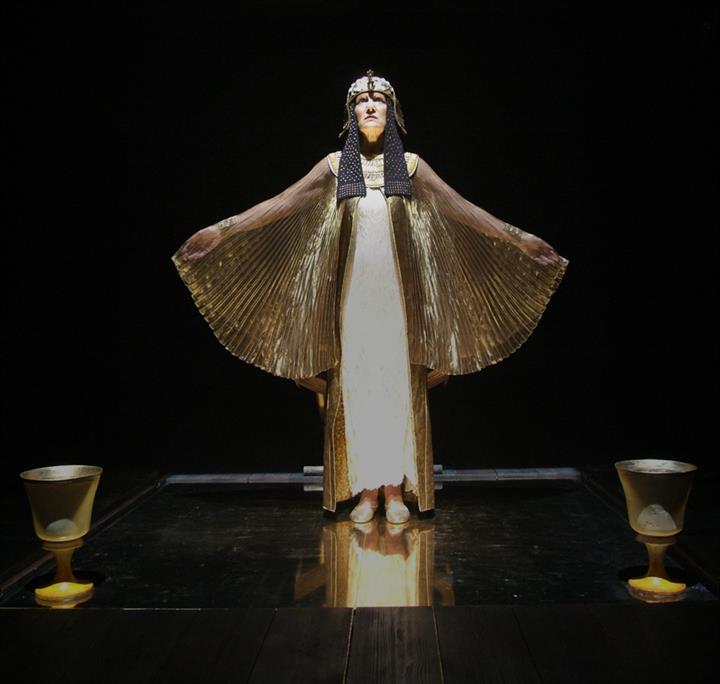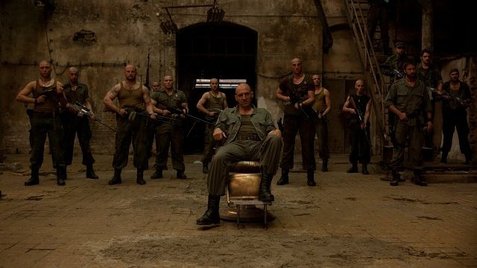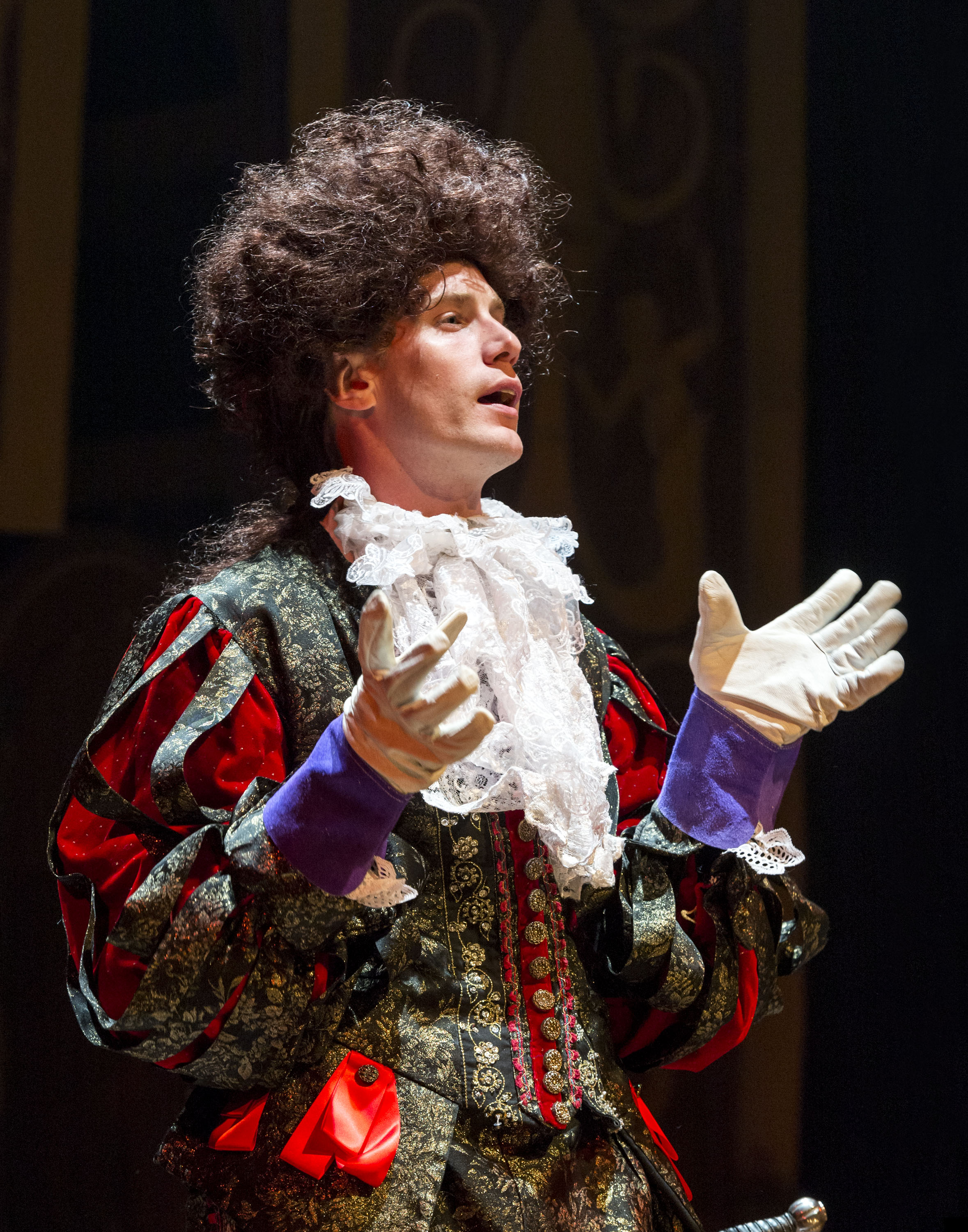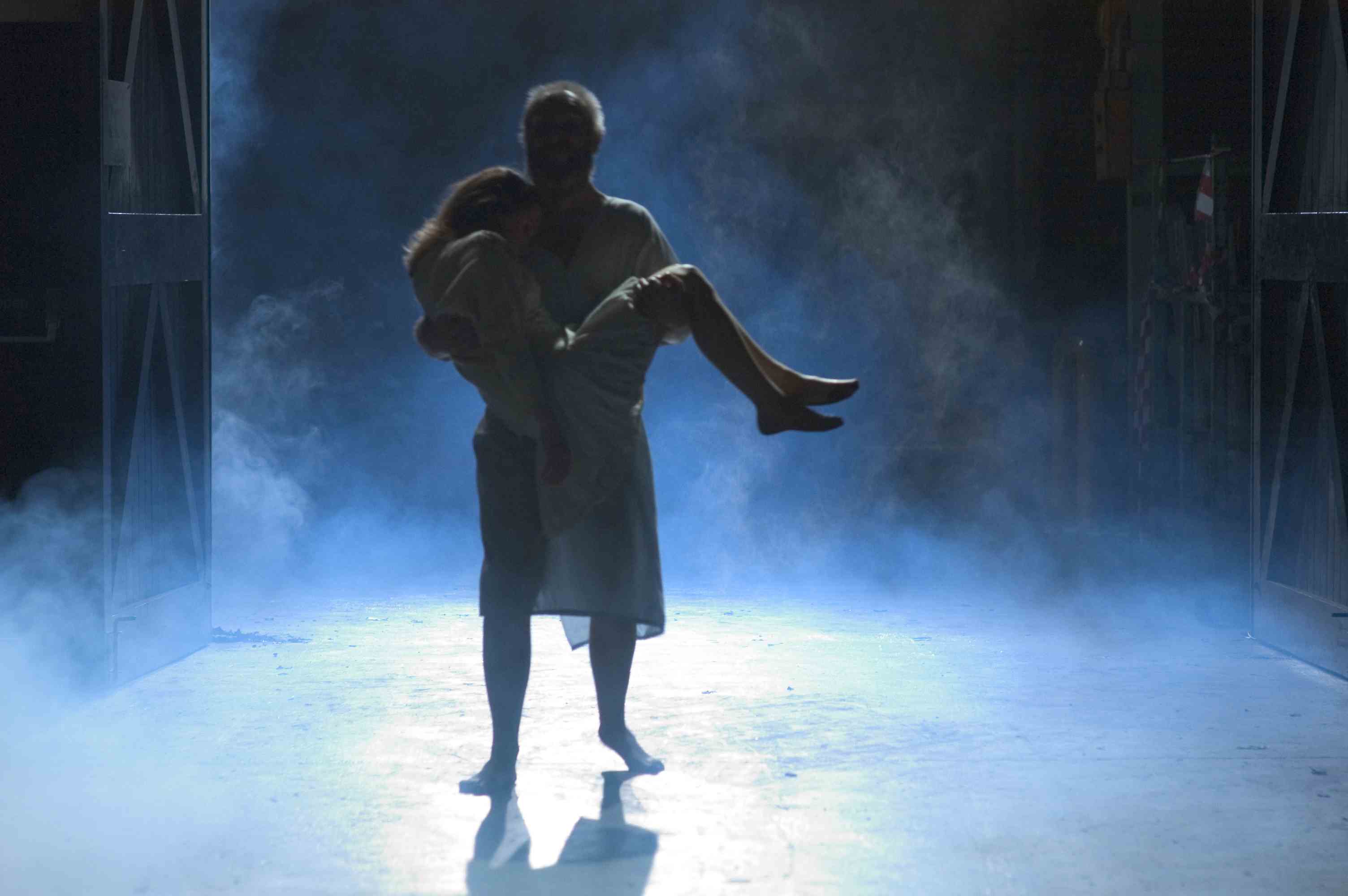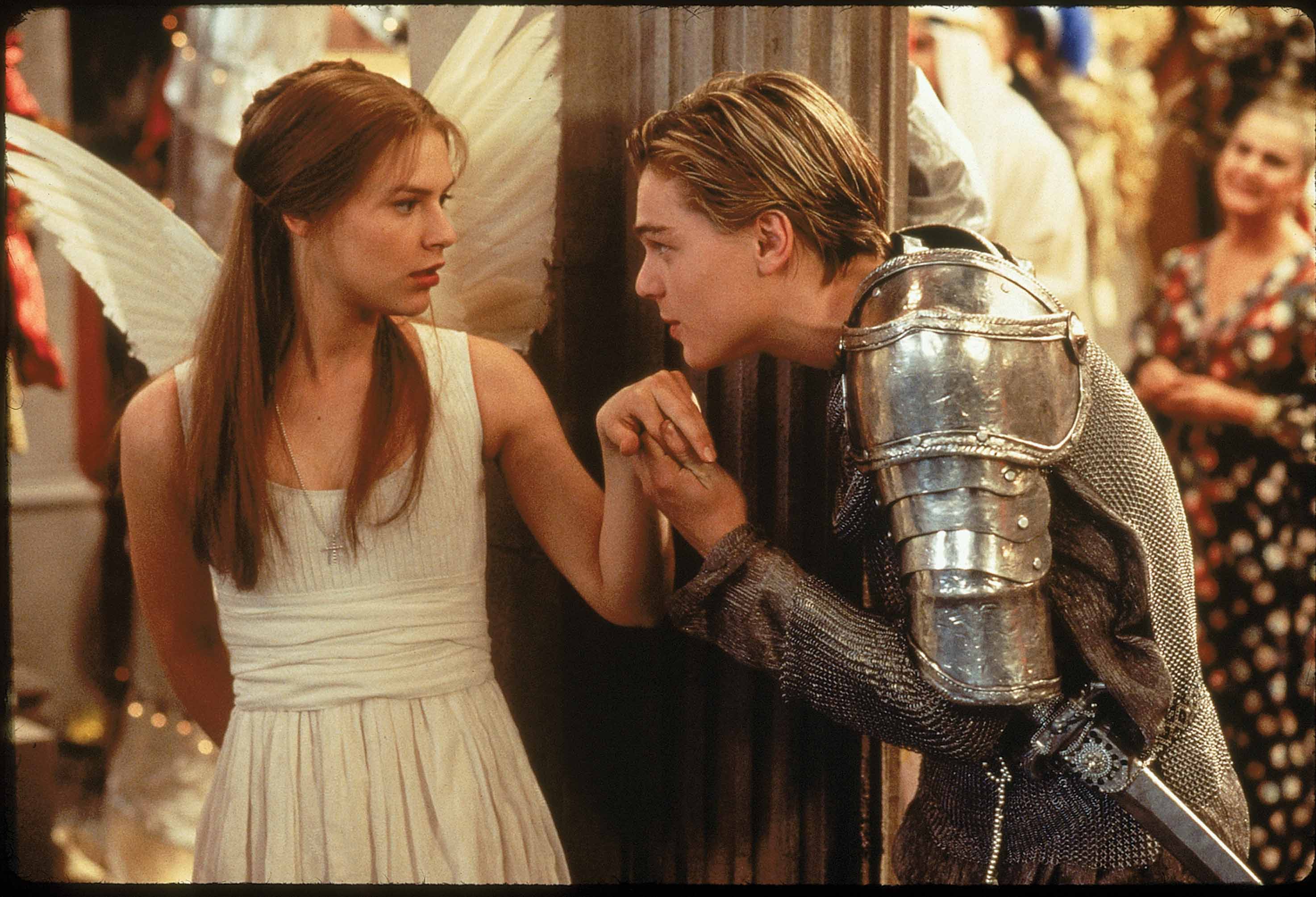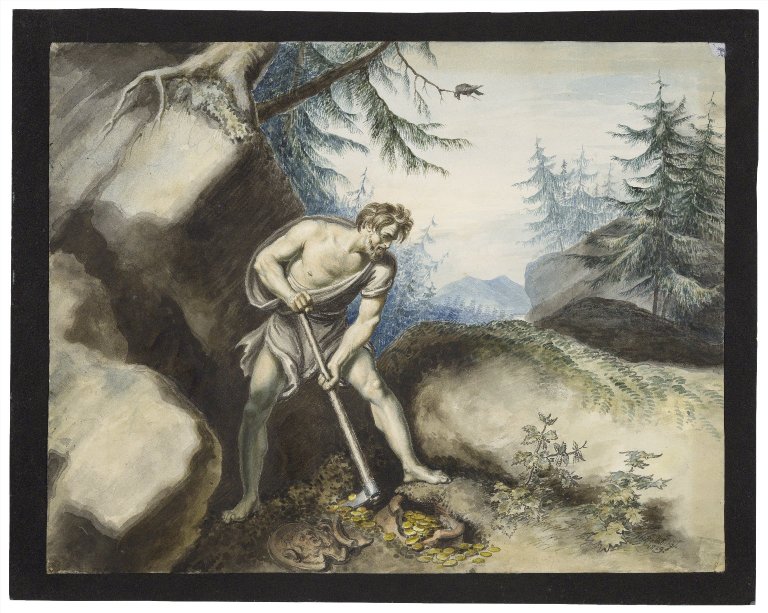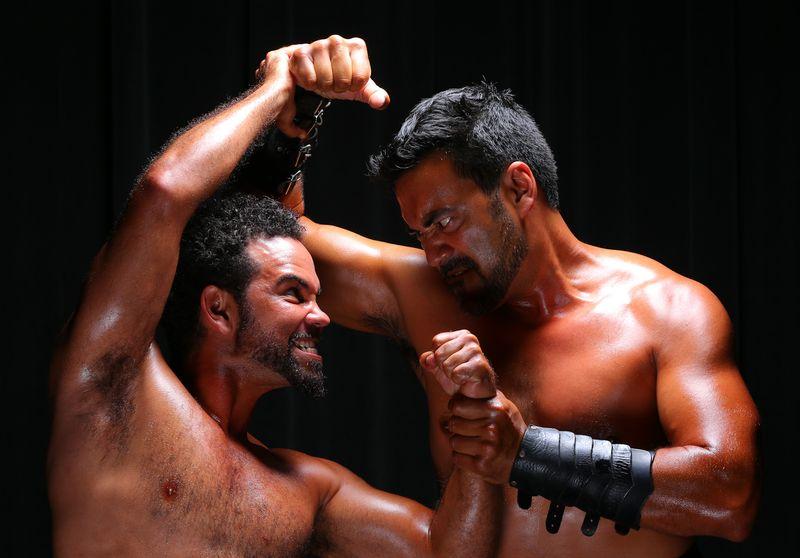What was a 'comedy' in his day was any play that ends in a marriage - not all of these plays are necessarily funny.
| All's
Well That Ends Well |
All's Well recounts the complicated love
story of Bertram, a young count, and Helena, a Countess'
ward, while flying through hoops and rings of politics. |
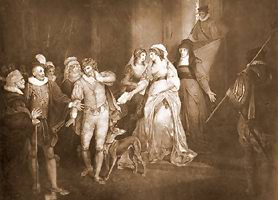 The big reveal at
the end!
|
| As
You Like It |
It's love at first sight, and then forced
separation for Orlando and Rosalind. In this hilarious
and heartbreaking story of sisterhood, exile, many a
family feud, and some slight crossdressing and trickery,
we see many happy couples formed, and laugh with them
along the way. |
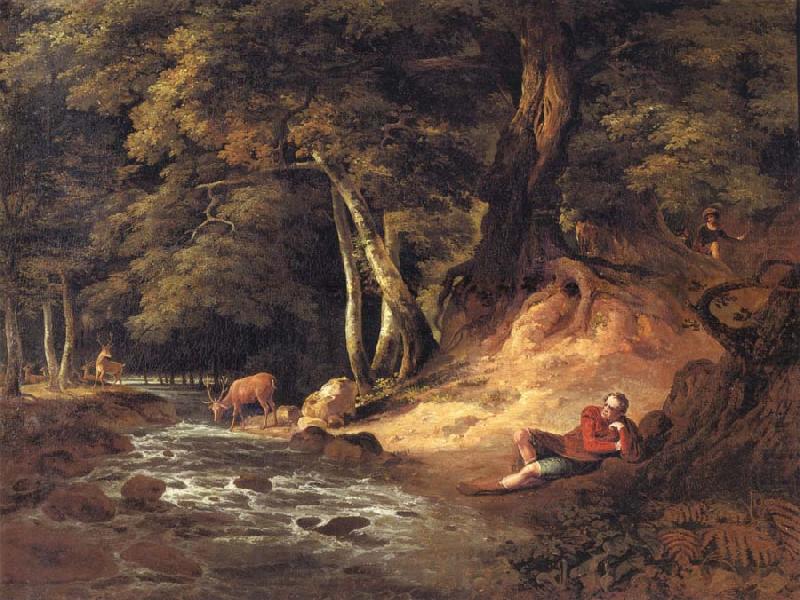 Jaques on the
riverbank - "All the world's a stage, and all the
men and women merely players..."
|
| Comedy
of Errors |
One of Shakespeare's complicated twin
stories. Egeon, a merchant in the wrong place at the
wrong time, must find his wife and twin sons, as they
have been separated at sea. Meanwhile, another pair of
twins wanders around. Confusion is undergone, twins are
mistaken for the other, promises are sort-of kept, and a
happy reunion awaits! |
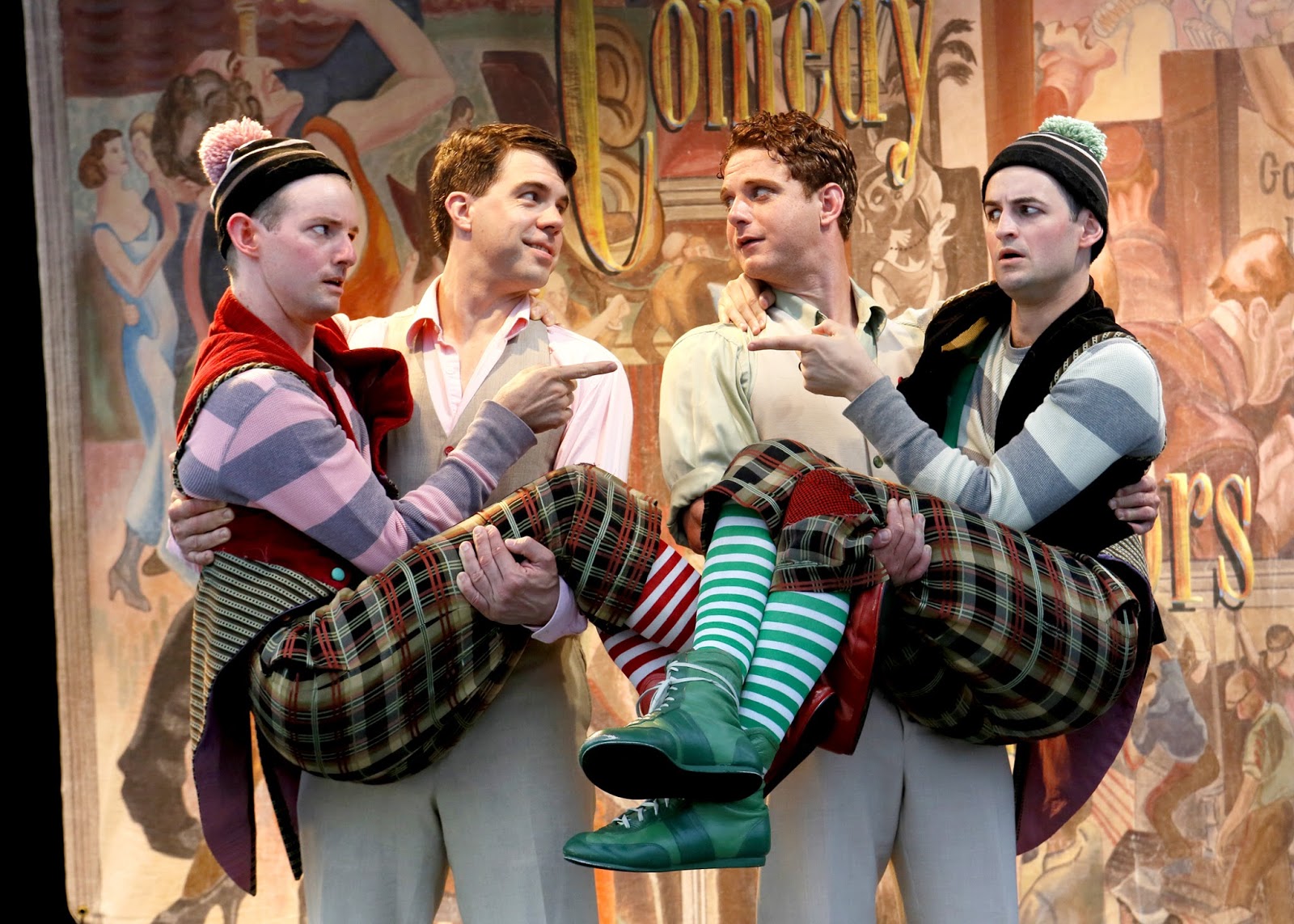 Two sets of twins
finding each other.
|
| Love's
Labour's Lost |
The King of Navarre and his three best
friends have sworn themselves away for three years of
solemn study - and sworn off women. Of course, they
immediately fall in love when the Princess of France and
her three friends visit the Court - and hilarity ensues.
Even though considered a comedy, there are no marriages
at the end - a shocking twist comes and the girls must
leave immediately, but they promise to eventually
return. |
 The men in disguise
as 'Russians'
|
| Measure
for Measure |
When a young man, Angelo, is given charge
of Vienna's government from the Duke while the Duke is
absent, he enforces an old law that those guilty of
fornication outside of marriage are to be put to death.
Claudio has gotten his fiancé pregnant - and Angelo is
willing to pardon him, if his sister Isabella will sleep
with him. Faced with an impossible choice, she must
choose between her purity and her brother's life. |
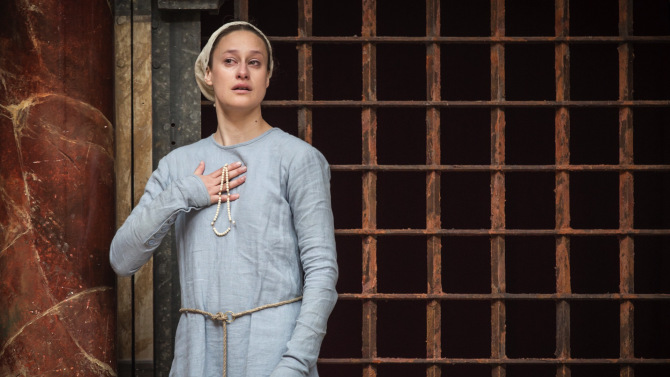 "To whom should I
complain?" Isabel emotionally wonders aloud in a
soliloquy after Angelo assaults her.
|
| Merchant
of Venice |
Bassanio needs money. His friend Antonio
takes money from a local Jew, Shylock, to help Bassanio
find his future wife, Portia. When Antonio's ships
unexpectedly sink, he cannot pay Shylock back, and
Shylock wants his payment/revenge in the form of a pound
of flesh. |
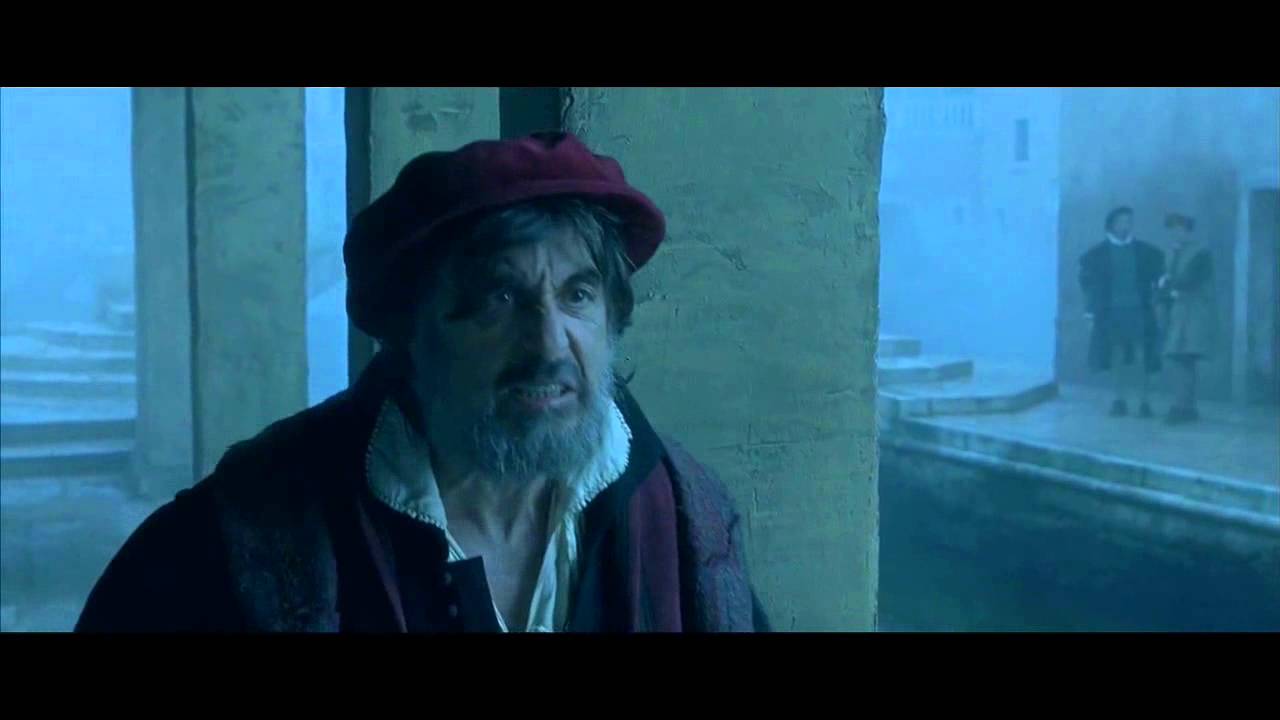 Al Pacino in the
film version delivering Shylock's most famous speech
- "Do not Jews have eyes?"
|
| Merry
Wives of Windsor |
John Falstaff, a crowd favorite from the
Henriad, stars in this play where he wrongly assumes two
women have fallen in love with him. After writing them
letters, they get in trouble with their husbands, and
decide to play an elaborate prank on him to get revenge. |
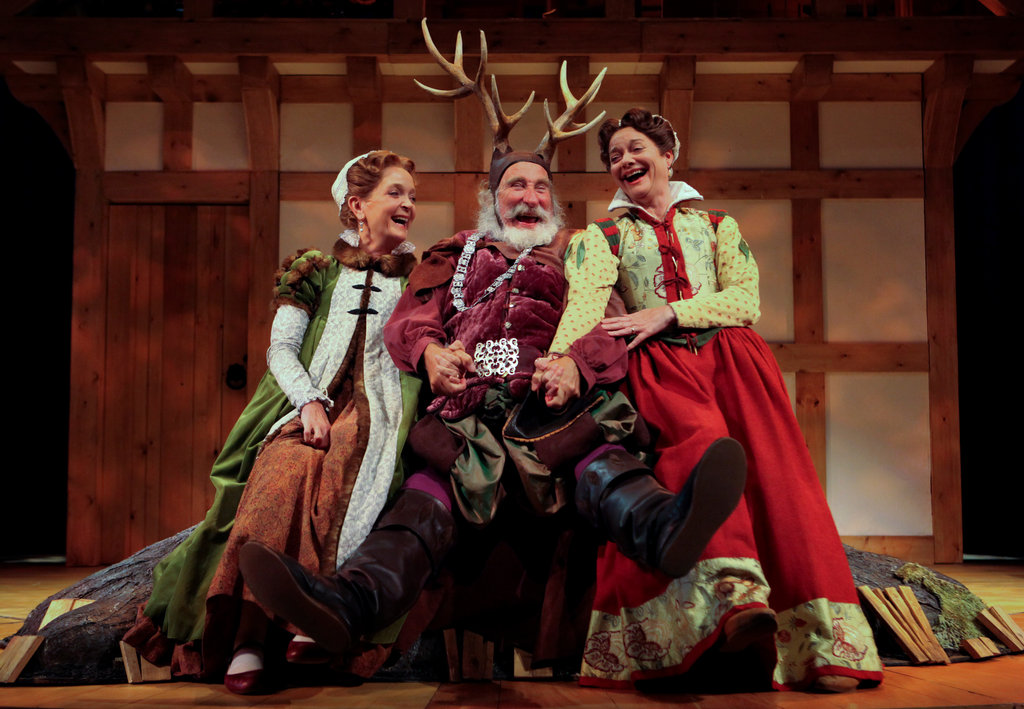 Falstaff in costume,
ready to be tricked.
|
| A
Midsummer Night's Dream |
The most produced play in the world. The
worlds of humans and fariefolk intersect in this magical
tale of four lovers, in and out of love. Puck, the
mischief wanderer of the night, wreaks havoc on
unsuspecting mortals, and somehow, everything works out
in the end. |
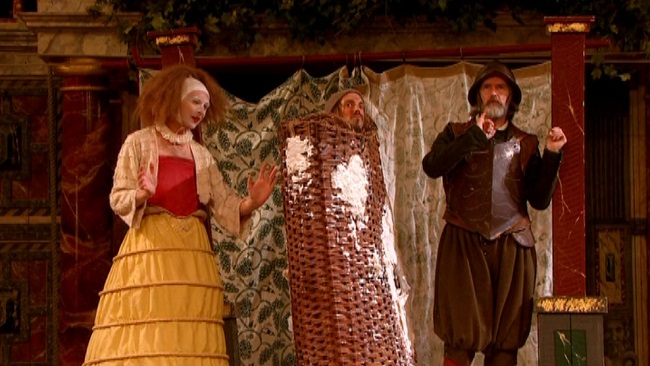 The Rude Mechanicals
perform their play at the end - and steal the show.
|
| Much
Ado About Nothing |
Two of the sharpest minds - Benedick and
Beatrice - loathe each other. When their younger friends
Hero and Claudio fall in love with each other, plots
begin to make the two worst enemies become lovers.
Through tricks, scandal, and scathing wit, true love is
found, and the value of a life is realized. |
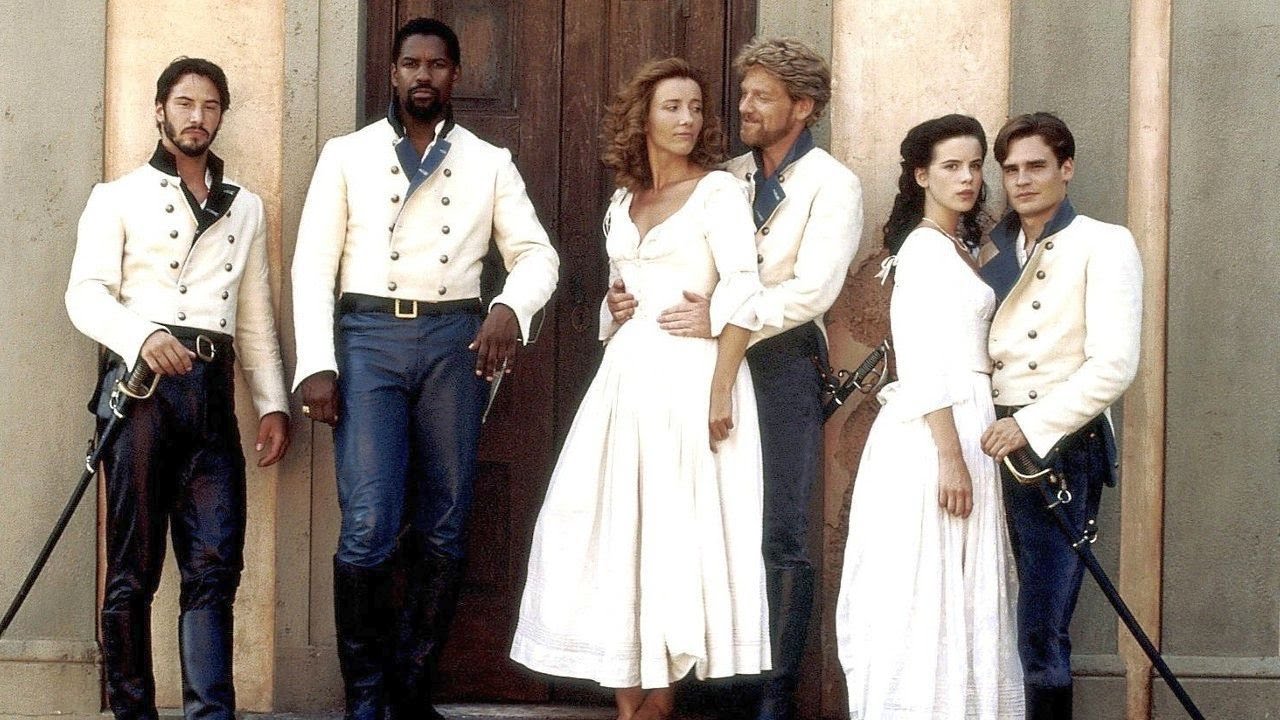 The cast of the 1993
film starring Kenneth Branagh and Emma Thompson.
|
| The
Taming of the Shrew |
Lucentio has fallen in love with Bianca,
beauteous daughter of the rich merchant Baptista. But
Baptista has a rule: Bianca cannot marry until Kate, her
older and much more fiery sister, is also wed. A young
man named Pertruchio learns of this deal (and the size
of Kate's dowry) and agrees with her father to marry
her. Kate, of course, protests, and with some of the
wittiest writing in the whole canon, Pertruchio attempts
to tame the shrew. |
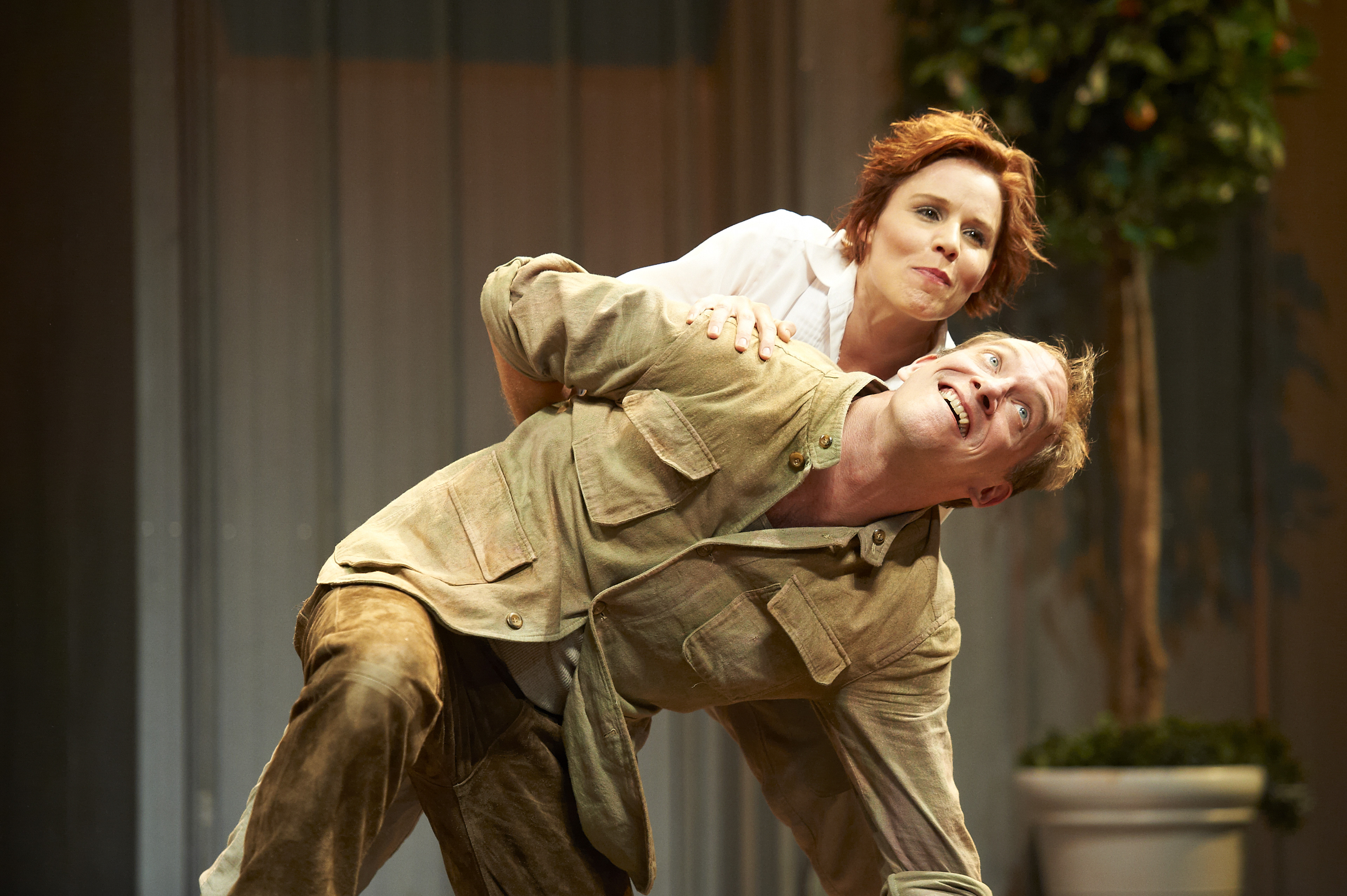 Kate and Petruchio
wrestle with their tongues - and a bit more.
|
| The
Tempest |
Prospero lives alone on a deserted island
with his daughter, Miranda, his faerie servant Ariel,
and their man-fish slave, Caliban. Having mastered
magic, when he learns that the one to do him wrong in
his days back in civilization, his cousin Antonio, is
nearby, he conjures up a storm to wreck their ship. Now,
new people are on the island, including the drunks,
Trinculo and Stephano, who take up with Caliban, and the
handsome Prince Ferdinand, who is captured by Prospero
and falls in love with Miranda. A wonderful, truly
heartwarming story of love and magic. |
 Prospero schemes
with Ariel.
|
| Twelfth
Night |
Another twin tale: Sebastian and Viola
are separated on a shipwreck. Both believing the other
to be drowned, they end up in Illyria, and live separate
lives for a while, Sebastian with his savior Antonio,
and Viola crossdresses and pretends to be a eunuch to
serve the Count Orsino. With some drunks added into the
mix and the best prank-pulling in all of Shakespeare,
this has become one of the most loved plays of all. |
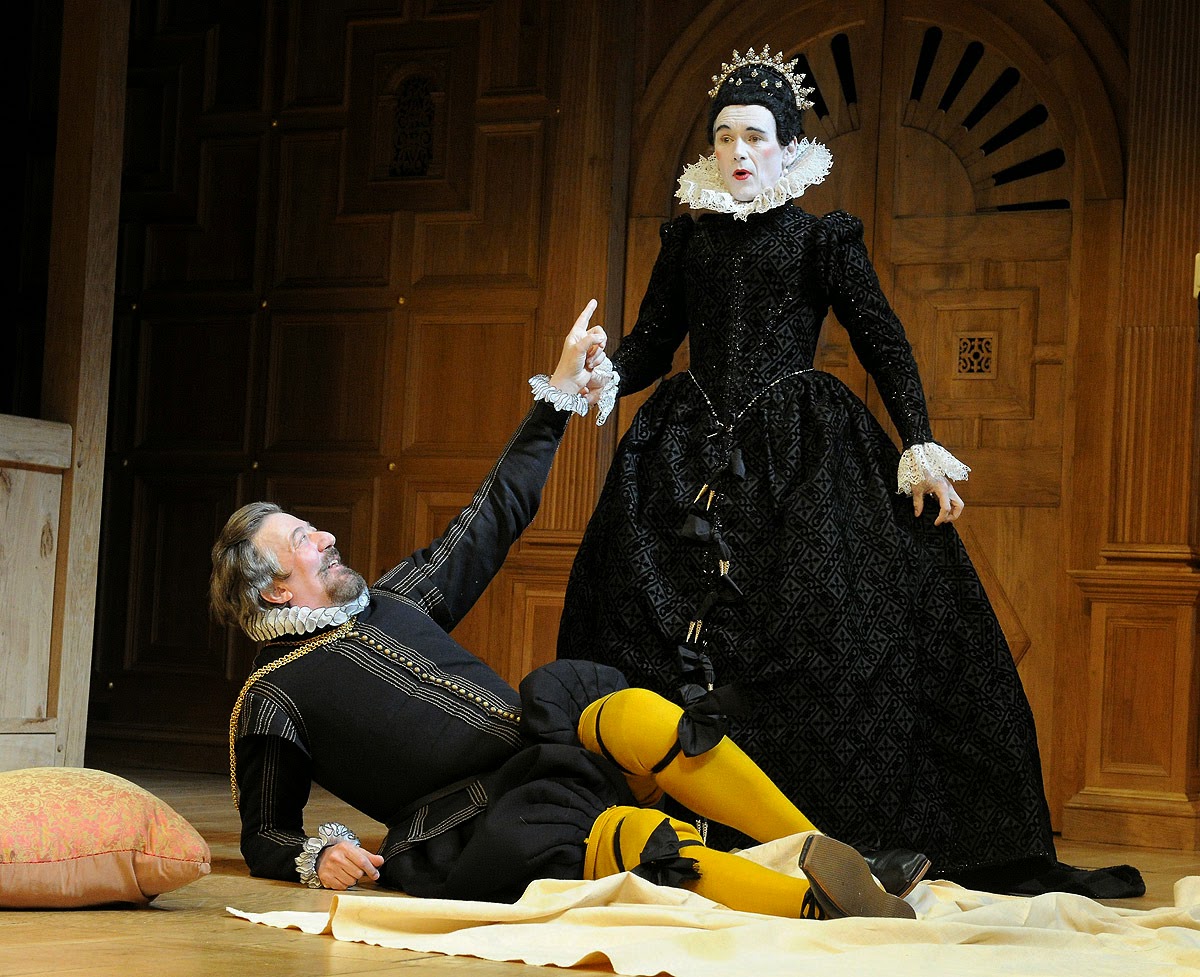 Stephen Fry as
Malvolio following instructions in a letter he
believes to be from his lady, Olivia, played by Mark
Rylance in the award winning 2012 all-male
production.
|
| Two
Gentlemen of Verona |
Valentine and Proteus are saying goodbye
- Valentine must travel to Milan to serve in the Duke's
Court. Proteus stays behind, as he is in love with Julia
in Verona. But when Proteus is forced to travel as well,
chaos ensues. Exchanging rings with Julia, he promises
fidelity. Valentine has fallen in love with a woman
named Silvia - and when Proteus arrives, he too finds
her irresistible. Julia follows, dressed as a page, and
finds a world of trouble. |
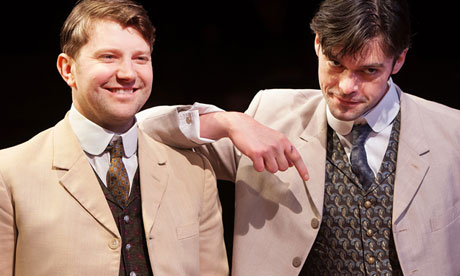 Proteus and
Valentine discuss their futures.
|
| The
Winter's Tale |
King Leontes of Sicilia's boyhood friend,
King Polixenes of Bohemia, is about to leave. When
Leontes has his wife, Hermione, entreat him to stay a
few days longer, he suddenly grows madly and feverishly
jealous, certain that she is cheating on him. He has
Hermione sent to prison, orders an assassination on
Polixenes (who escapes), and banishes his own newborn
daughter to some far off land, believing the infant to
be a bastard. When the gods prove him wrong, he loses
everything - his other son and wife fall dead. Fast
forward 16 years: his daughter is still, somehow, alive. |
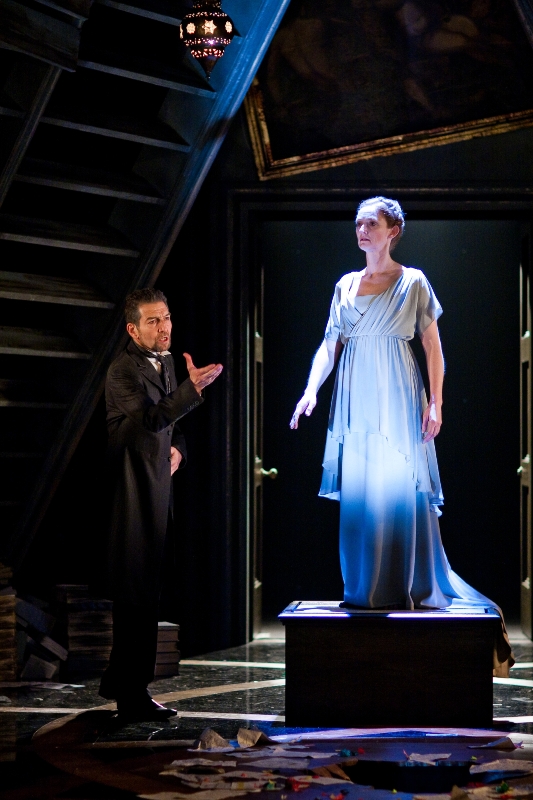 16 years after her
death, Leontes gazes on the most lifelike statue of
his wife he has ever seen.
|
| Richard
II |
This play tales the tale of the immature
and juvenile King Richard II and his last days in power
before Bolingbroke, the future King Henry IV, takes
over. A tale of murder, terror, and the reflection of
what it means to be a king has made this an all time
favorite. |
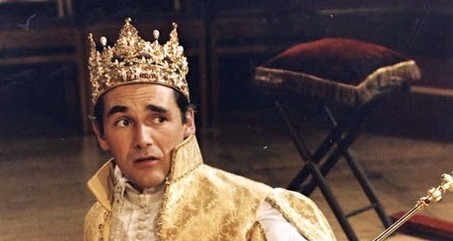 Mark Rylance in the
starring role with the infamous crown upon his head.
|
| Henry
IV, Part 1 |
There is treachery afoot in England -
young Hotspur is refusing to release his prisoners from
the French and Welsh. Even after a direct meeting with
the King, he disobeys orders. Meanwhile, young Prince
Hal is in a tavern, getting drunk with Falstaff and his
friends, much to the chagrin of the King. To help prove
himself, Hal issues a challenge to Hotspur. They come
face to face at the Battle of Shrewsbury, with armies on
both their sides. |
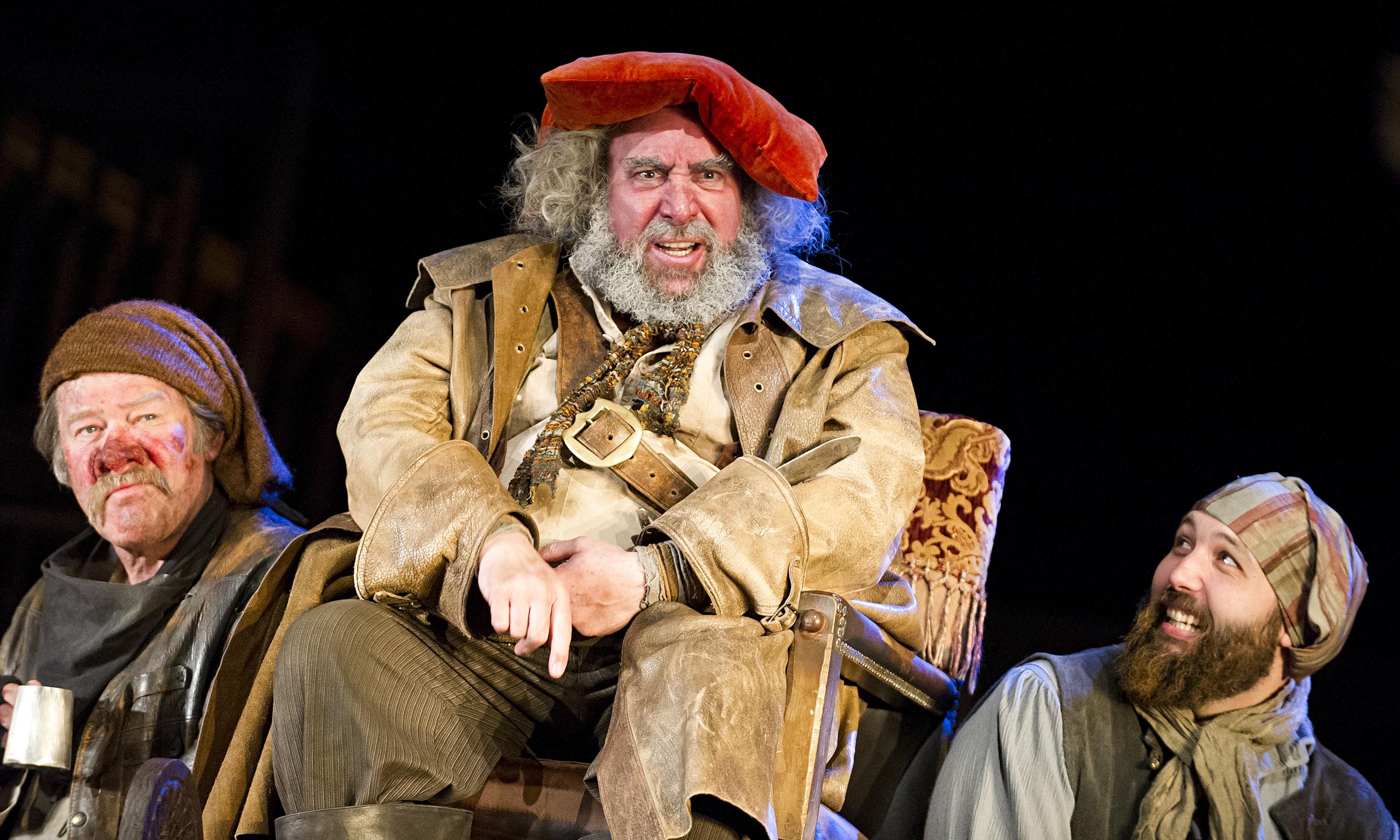 Antony Sherr's
magnificent, magnetic Falstaff in the RSC
performance two years ago.
|
| Henry
IV, Part 2 |
News of the battle of Shrewsbury spreads
far - there is a hint of treachery in the North.
Falstaff has fled Hal's company and travels far away,
finding old friends. The King is very ill - soon he will
die, forcing Hal to suddenly grow up, and reflect on
what it is to be responsible, to be a leader, father - a
King. |
 Tom Hiddleston as
Prince Hal, who, thinking his father dead, picks up
the crown.
|
| Henry
V |
Young Hal has assumed the crown. When the
young French Dauphin shows him great disrespect, he
prepares all of England for war with the French, and he
himself will lead them into battle. |
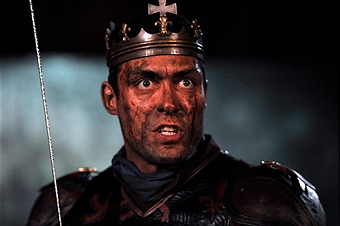 Alex Hassell as the
blood-stained King in the RSC production last year.
|
| Henry
VI, Part 1 |
King Henry V is dead, and with the new
King being so young, nobles are beginning to quarrel.
News of defeats in France arrive, and it is discovered
that Joan la Pucell, also known as Joan of Arc, has
taken up arms with the French in what she believes is a
war gifted upon her by God. Meanwhile, a certain Richard
Plantagenet begins to learn that he might have a claim
to the throne, and Henry finds a wife through the Duke
of Suffolk, who woos Queen Margaret on his behalf. |
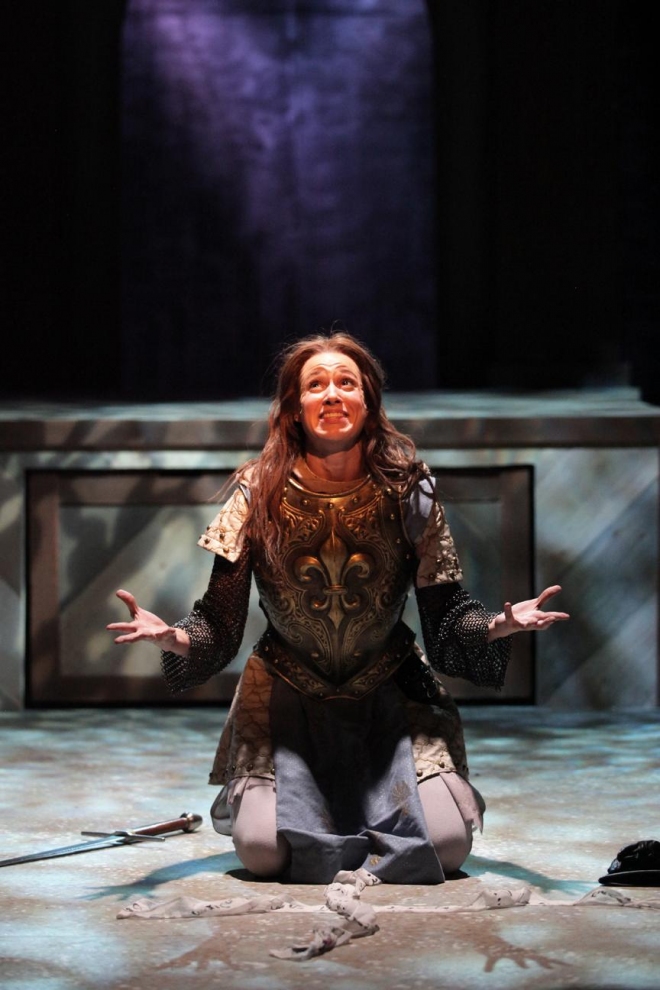 Joan la Pucelle
praying to God and invoking black magic to help her
win the fight.
|
| Henry
VI, Part 2 |
Suffolk and Queen Margaret have fallen in
love. At the same time, there is a dispute between York
(Richard Plantagenet) and Somerset over who should have
regency in France. Suffolk's men kill a fellow noble,
and he is banished, and says goodbye to Margaret. York
stirs up rebellion, and, with his belief that the crown
belongs to him, in a disagreement with the King, kills
Somerset and causes the King to flee. |
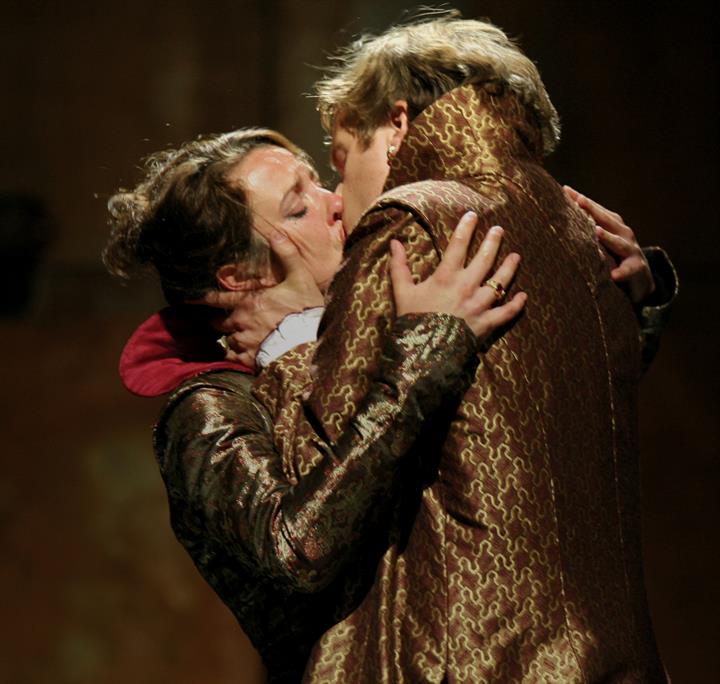 Suffolk and Margaret
having and illicit goodbye.
|
| Henry
VI, Part 3 |
York has claimed the throne. They allow
Henry to remain king on the condition that upon his
death, York's children will inherit the throne. They are
about to assume it now, but the Queen returns with an
army, kills York's youngest son, and taunts him with a
handkerchief stained with his blood before killing York
himself. York's youngest son, Richard, kills Clifford,
the Queen's right hand man in revenge. Henry flees to
Scotland, Edward briefly becomes King, and Richard is
now the Duke of Gloucester. In the next battle, Richard
kills young Edward (Edward's son) in front of Queen
Margaret, and then leaves for London, where he kills
King Henry. Older Edward becomes King. |
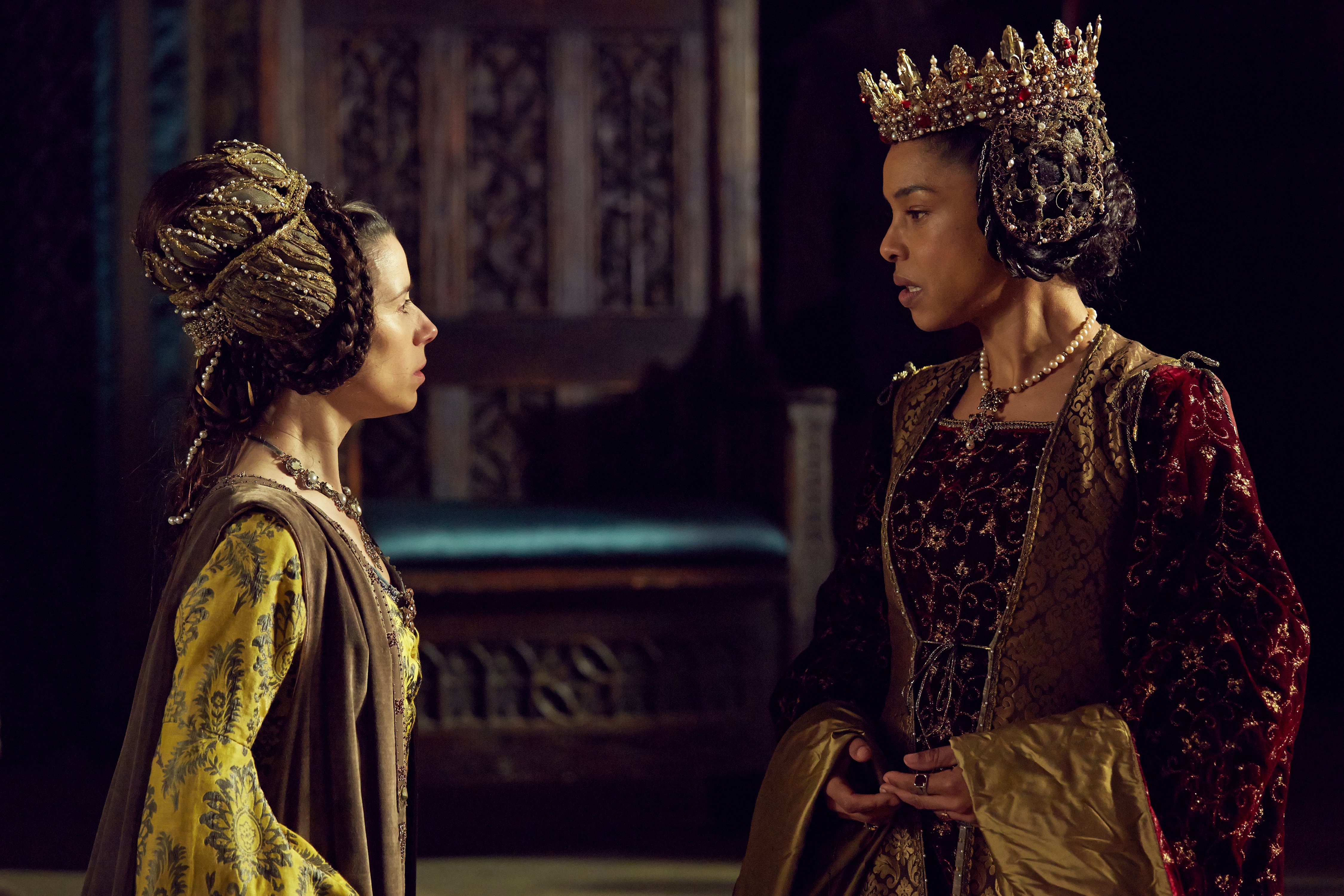 Queen Margaret
conspires with the Duchess.
|
| Richard
III |
Richard wants to be king. First, he has
his older brother Clarence imprisoned and murdered.
Then, he woos the wife of the now dead Henry VI (whom he
murdered) in the middle of Henry's funeral procession.
King Edward is now very sick, and dies shortly after the
news of Clarence's death. Richard then plans the death
of Edward's two other sons, and with no obstacles left,
finally becomes King. In his sleep the night before a
big battle, he is visited by all the ghosts of those who
he has killed. The next day, he falls to Richmond, who
then takes the crown as Henry VII. |
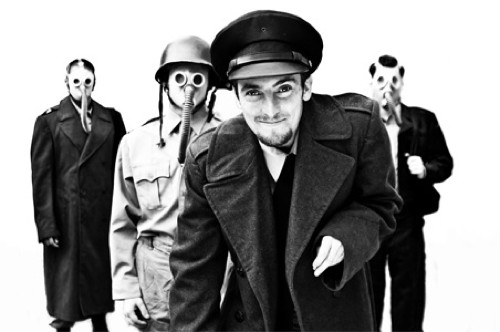 Vince Eisenson as
the hunchbacked murderer-king.
|
| Henry
VIII |
A rivalry between Dukedom's incites King
Henry VIII, who is looking for a divorce from his wife,
Katharine. It is revealed that one of the Dukes,
Wolesly, has been writing to the Pope with ulterior
motives of having a marriage between Henry and the
French. Katharine, abandoned, falls ill. Meanwhile, a
man named Oliver Cromwell begins making moves around
England. |
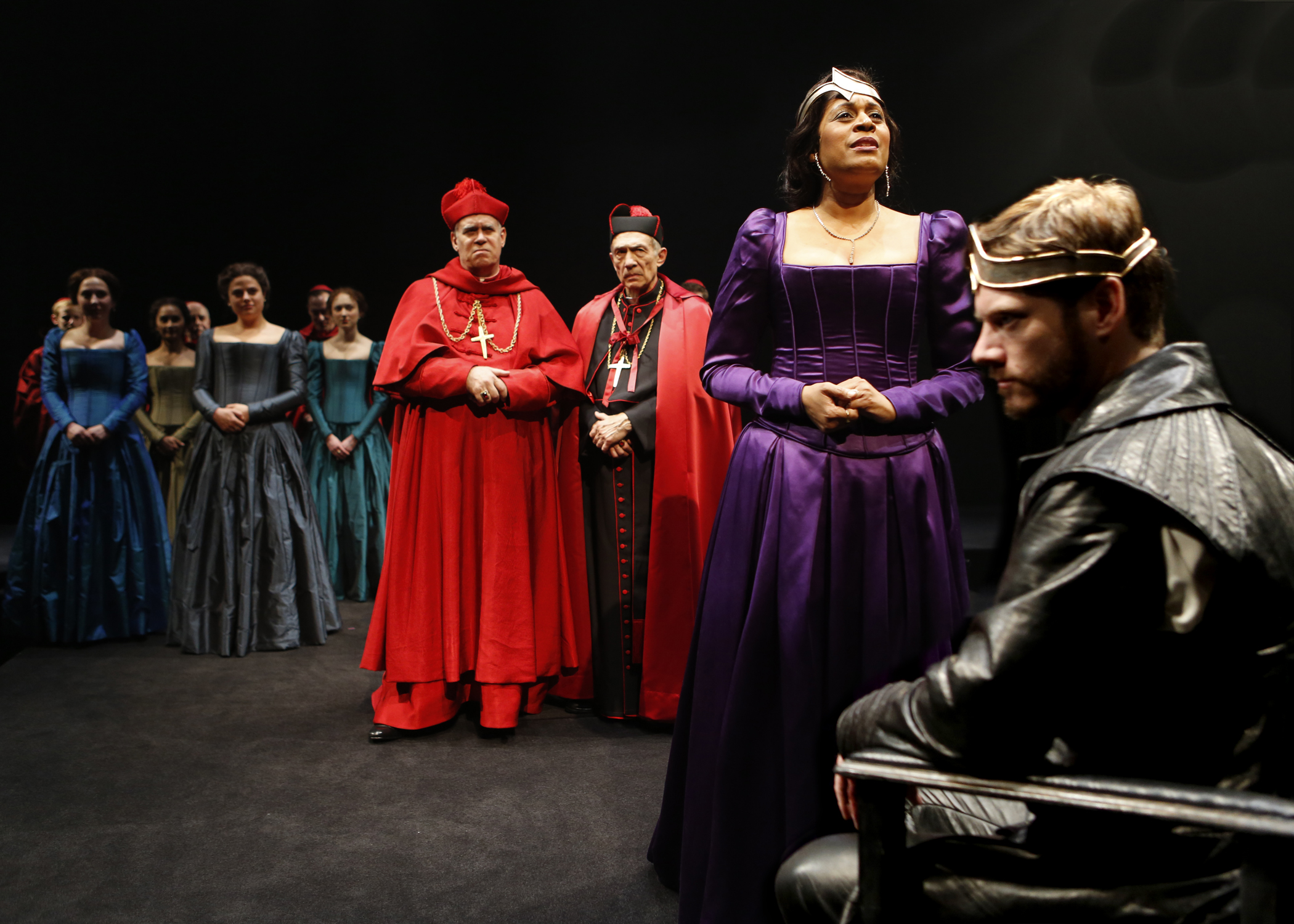 At the trial between
Queen Katharine and King Henry.
|
| King
John |
The French are demanding that the English
yield them the crown. At home, two brothers argue over
inheritance of a Dukedom. It is revealed that Philip
Faulconbridge, hereby known as Faulconbridge the
Bastard, is the bastard son of Richard III. He becomes a
great ally to John in the war, but is plotting behind
his back how to steal the crown. After several large
battles and many deaths, King John dies of poisoning,
and the future of the country is uncertain. |
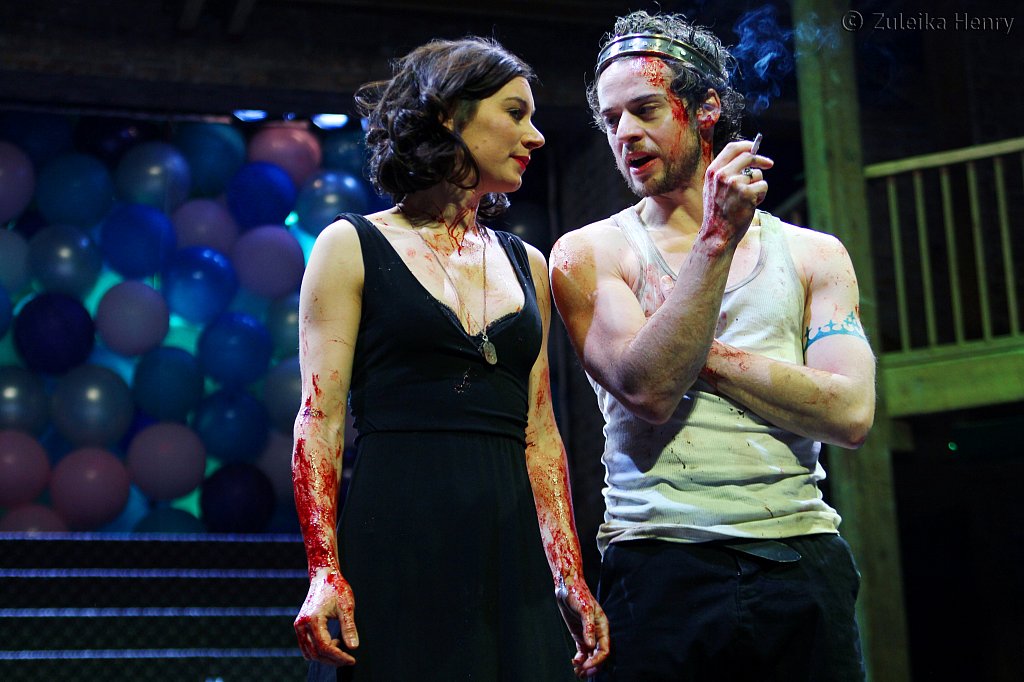 Pippa Nixon, left,
as a genderbent Bastard, conferring with Alex
Waldmann, as King John, after a battle.
|
| Pericles,
Prince of Tyre |
Antiochus has made a deal that anyone who
can solve his riddle can marry his daughter. However,
it's a trap, for the answer to the riddle reveals
Antiochus' incestuous relationship with her, and anyone
who knows will be put to death. Pericles realizes the
answer, and leaves, aware of the danger. While he is
gone, his city, Tyre, falls into disarray, and rebels
threaten to take his title. Realizing this, he sets for
home to take it back. |
 Gower, the poet,
opens the play with a soliloquy.
|
